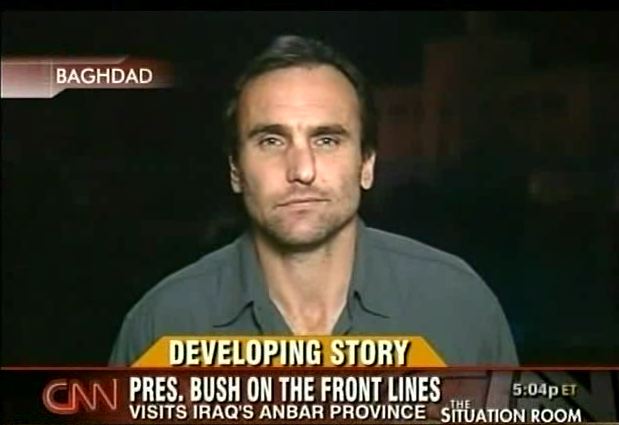TSR: "...get on board with this program or get off -- you're about to be steamrolled."

Length: 4:02
LARGE (47.3 MB) ----- SMALL (4.8 MB)
WOLF BLITZER: President Bush made the unexpected visit to an area that's been one of the bloodiest battlegrounds in Iraq.
What kind of message is he trying to send?
Joining us now, our correspondent in Baghdad, Michael Ware -- Michael, the president simply shows up in the Al Anbar Province, makes the point that a couple of years ago this would have been unthinkable. And I guess by implication it means things are getting better, at least where he is, at the Al Assad military base.
MICHAEL WARE, CNN CORRESPONDENT: Yes, Wolf.
It was absolutely no surprise that of all the things that President Bush decided to highlight during his very secretive lightning tour here to Iraq was Al Anbar Province. It's been a regular war drum of success that he's been beating repeatedly in successive speeches.
I mean, forget the surge. The surge, militarily, has achieved the things that it has and it's fallen short where it has. And the political developments that were supposed to follow through from it certainly haven't happened. They've fallen in a disastrous heap.
So the one bright shining light that the president has to show success is Al Anbar Province.
So gee whiz, where did he go?
What, of course, the president didn't talk about is the real nature of this success, that, essentially, when he says tribes, he's meaning Sunni insurgents. He's talking about, as the president said, those who fought alongside Al Qaeda against us are now fighting alongside us against Al Qaeda.
Now, perhaps it's not without poignancy that in Al Assad Air Base today with President Bush was the Prime Minister Nuri Al-Maliki, someone who until recently was deeply opposed to this tribal program, fearing that this was America building Sunni militias to rival the Shia militias of Maliki's own government.
So -- and to sit down with some these tribal sheikhs, with Prime Minister Al-Maliki, I don't think that was without meaning. I think that essentially told Maliki, get on board with this program or get off -- you're about to be steamrolled.
Now, we've just come back from Anbar Province. We've been with these tribal forces. We were with the Islamic Army, Brigades of 1920 Revolution, former al Qaeda. They don't hide the fact that they're against Maliki. They're against his government. They're still against the occupation.
And it was patently clear that the U.S. was indeed supporting them, giving them weapons by putting them straight into police uniforms, teaching them American tactics and putting them back out on the street.
So, really, they are doing exactly what the government fears -- building anti-government forces -- Wolf.
BLITZER: In a nutshell, what would happen if the U.S. decided to start pulling its Marines and soldiers out of the Al Anbar Province over the next few months? How would that unfold?
WARE: Well, we'd see, within the province itself, a consolidation of the tribal and Baathist nationalist insurgent power. What would be interesting would be to see whether the government would attempt to make inroads to curb that consolidation, because once they leave Al Anbar, once the U.S. forces leave Iraq, I can assure you Al Anbar will be one of the key battlegrounds in the civil strife that everyone is convinced will follow and U.S. intelligence agencies constantly warn against in terms of reducing the troops. That will be the price.
So Al Anbar -- post-American presence, in Iraq itself, post-American occupation -- will be something possibly very akin to Lebanon in the 1980s. And Al Anbar will be bloody soil once more -- Wolf.
BLITZER: Not a very pretty picture, indeed.
Michael Ware, thanks very much.
